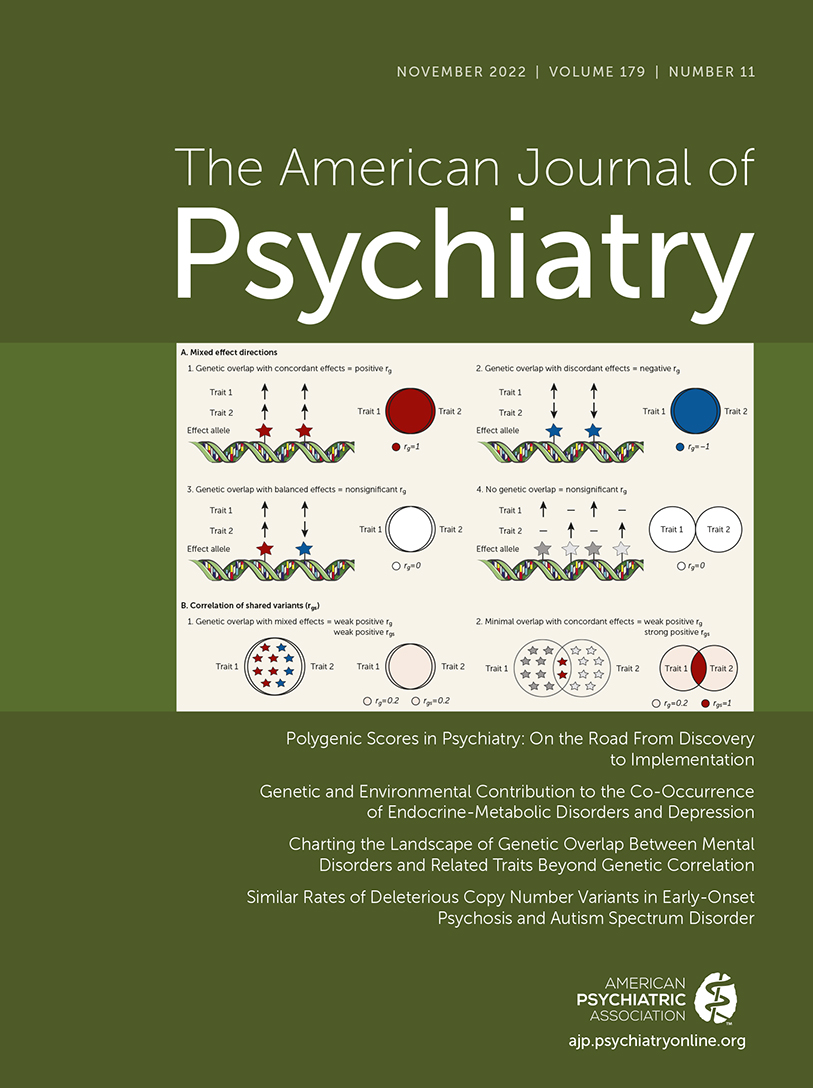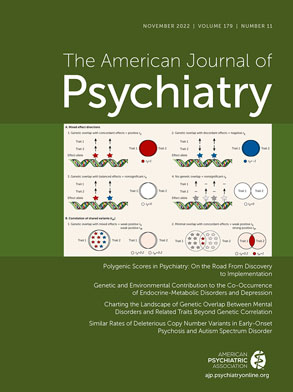Being diagnosed with an endocrine-metabolic disorder such as type 1 diabetes, type 2 diabetes, polycystic ovary syndrome (PCOS), or obesity is known to increase the risk of a subsequent diagnosis of major depressive disorder (hereafter referred to as depression), and vice versa (
1,
2). However, the causal and functional relationship between endocrine-metabolic disorders and depression is still poorly understood, and the studies to date have at times reached seemingly contradictory conclusions. For instance, recent causal inference studies have suggested that type 2 diabetes and obesity can lead to a subsequent depression diagnosis (
3,
4), whereas another study found higher (relative) carbohydrate intake to reduce depression risk in a causal manner (
5). Furthermore, the gut microbiome, shown to be influenced by the host’s genetics (
6), may be associated with both diabetes and depression (
7,
8). Taken together, the literature depicts a remarkably complex relationship between endocrine-metabolic disorders and depression, with various potential pathways of bidirectional correlations (see
Figure 1).
To help solve this important puzzle, Leone et al., reporting in this issue of the
Journal (
9), utilize a population cohort of 2.2 million individuals born in Sweden and their first-degree relatives to characterize the genetic and environmental relationship between endocrine-metabolic disorders and depression. The authors performed two types of analyses. First, they examined the association between endocrine-metabolic disorders and depression in case subjects and the extent to which these conditions coaggregated in family members, who, to some degree, share both genetics and environment. Despite the low observed frequency of some of the endocrine-metabolic conditions and their co-occurrences, the relatively large sample size in the Swedish registers allowed for the detection of significant positive associations between all endocrine-metabolic disorders and depression in case subjects as well as in their family members. Second, the authors performed a quantitative analysis using the siblings to estimate (additive) heritabilities, as well as genetic and environmental correlations between endocrine-metabolic disorders and depression. The authors found genetic correlations for the sibling pairs (see the article’s supplementary Table S12) to be 0.31 between type 2 diabetes and depression, 0.21 between obesity and depression, and 0.34 between PCOS and depression. However, the estimated genetic correlation between autoimmune disorders and depression was smaller, with 0.13 for hypothyroidism and approximately 0 for type 1 diabetes. Interestingly, shared environmental effects for siblings were small, suggesting that the parental environment does not play a large role in the observed associations. The large sample size of the quantitative genetic analysis (more than 778,000 sibling pairs) allowed Leone et al. to estimate the genetic overlap with more accuracy than previous studies, clearly demonstrating a positive association between endocrine-metabolic disorders and depression that is due to both genetics and the environment. These results are consistent with recent findings (
10,
11) and bring clarity to a previously unclear picture of how these serious conditions with notable population prevalence relate to each other.
Recent efforts toward erasing the boundaries between psychiatric and somatic disorders have highlighted the inaccuracy of the dichotomous classification of the former as solely falling under the domain of the brain and the nervous system. One such example is the negative genetic correlations reported for anorexia nervosa with metabolic (e.g., type 2 diabetes, insulin resistance, circulating leptin levels) and anthropometric measures (e.g., body mass index, overweight, obesity), reestablishing this deadly eating disorder as a metabo-psychiatric disorder as opposed to one having a purely psychiatric origin (
12). Considering our improved understanding of the complex interplay between monoamines (
13), cytokines, and the microbiome (
14) influencing the risk of depression, Leone and colleagues’ findings also point toward the need for a more comprehensive evaluation of the pathophysiology of depression. Importantly, this study is a crucial first step toward setting the path for future work establishing a causal relationship between endocrine-metabolic disorders and depression. Although making a causal inference, especially in a retrospective cohort study, is very difficult, individual medical trajectories could provide important clues, such as the temporal relationship between two diagnoses (i.e., the order of diagnosis). With the goal of identifying modifiable causal risk factors that could be targeted in public health efforts and preventive treatments, understanding the causal relationship between comorbid conditions such as endocrine-metabolic disorders and depression is critical.
Population Cohorts Facilitate Accurate and Unbiased Risk Estimates
The Leone et al. study is a reminder of how powerful population register data sets are for studying disease etiologies. For more than half a century, the Nordic countries (Denmark, Finland, Iceland, Norway, and Sweden) have collected individual-level data, including medical, social, financial, and geographical information, and incorporated them into their respective population registers. These registers have become and invaluable resource for medical and public health research, as well as demographic and economic research. The sample sizes available in these population-wide registers allow inferences to be made with unprecedented certainty and impressive detail. The broad inclusion of individuals in registers reduces ascertainment biases, which translates to more accurate population risk estimates, otherwise difficult to obtain. These data have proven to be incredibly valuable for identifying risk factors and understanding medication response and long-term side effects, as well as studying demography and health economics. Indeed, register-based research has often influenced public health policies directly.
Genetic Data Increase the Value of Population Cohorts for All Researchers
A major benefit of the population registers is that once new individual-level information is added to the registers, it can be linked with any other register information available in the cohort, thereby enriching the entire data set. With genetics playing an important role in many diseases and health outcomes, adding individual-level genotypes to population register data offers new research opportunities. Future efforts could expand on the work by Leone et al. by incorporating methods such as Mendelian randomization (
15) through the utilization of individual-level genetic data to elucidate the causal mechanism behind the comorbidity of endocrine-metabolic disorders and depression, as well as estimating individual variants associated with the outcome of interest. Summary statistics from external genome-wide association studies (GWASs) could also be used to examine genetic relationships with thousands of other relevant health outcomes. In addition, the family information available in the registers could be used to increase power in GWASs (
16). Moreover, individual-level genotypes can be used to study gene-by-environment interactions, as well as to account for population structure and other potential confounders in epidemiological studies. These examples highlight the synergies of making more data available in population registers.
More Register-Based Research Helps the Field Move Forward
There is no doubt that the population registers of the Nordic and other countries are a rich and comprehensive source of data; however, they are also distinct and subject to differing national regulations. The information collected also varies, as well as how it is structured in different registers. Therefore, to better actualize the benefits of these population registers, there is a clear need to standardize the data format across countries. The widespread use of ICD-10 codes goes a long way, but agreeing on standardization protocols for the data in general would significantly improve coordination efforts across Nordic countries. Such protocols would encourage international collaborations by, for instance, enabling cross-country validation of research findings, as well as enabling more conclusive meta-analyses.
Finally, perhaps the most important limitation of register-based research is data access, which is often complicated, even for experienced researchers. The UK Biobank project is an example of providing broad access to external researchers, which, as a result, established the UK Biobank as the single most studied genetic data set, with over 28,000 registered researchers from 98 countries, and numerous examples of findings directly impacting clinical care. Inspired by the UK Biobank, we envision that providing secure access for external researchers to population register data could similarly boost efforts to harness the full research potential of population registers. These initiatives should of course safeguard individual privacy, adhere to the European Union’s General Data Protection Regulation and other relevant regulations, and take geopolitical concerns into account. Advances in the sharing of population register data would improve our understanding of both the etiology and the comorbidity of diseases and consequently benefit not only the population from which the data originated, but society as a whole.


